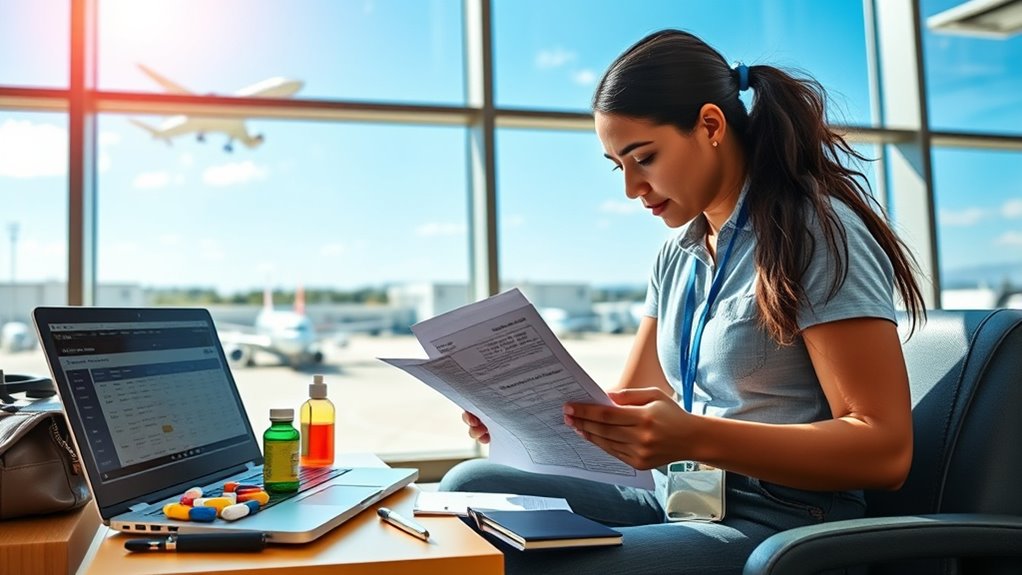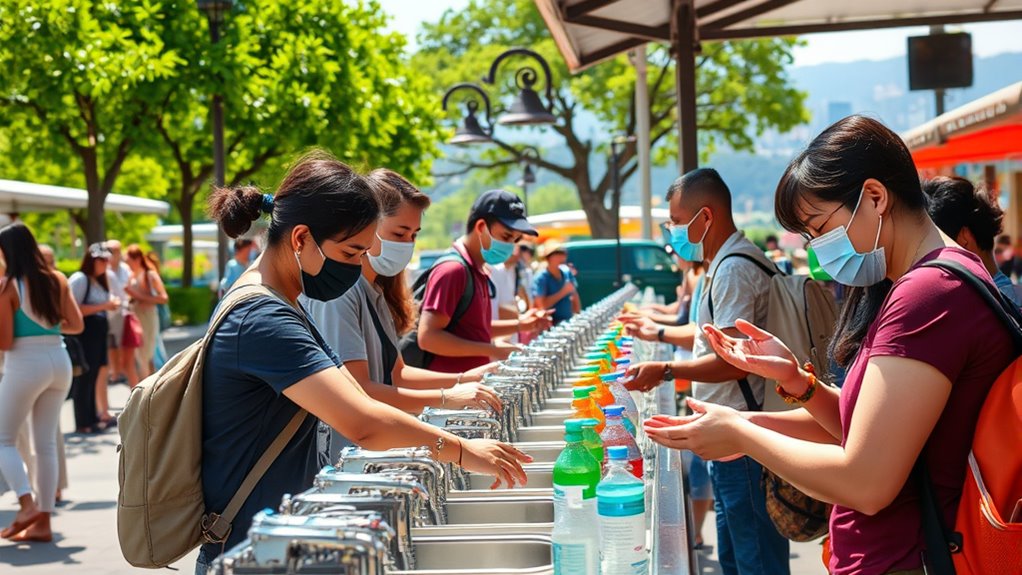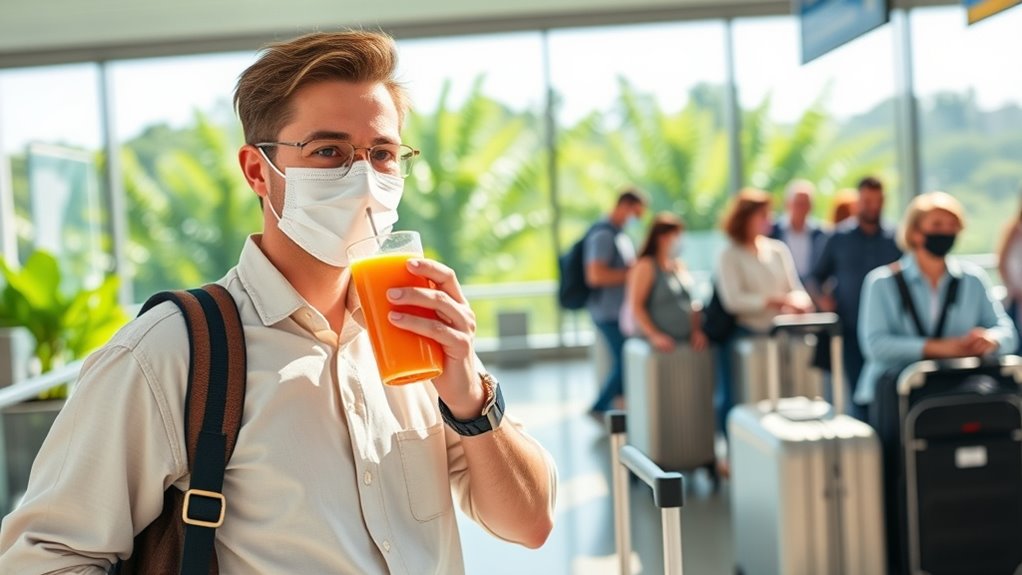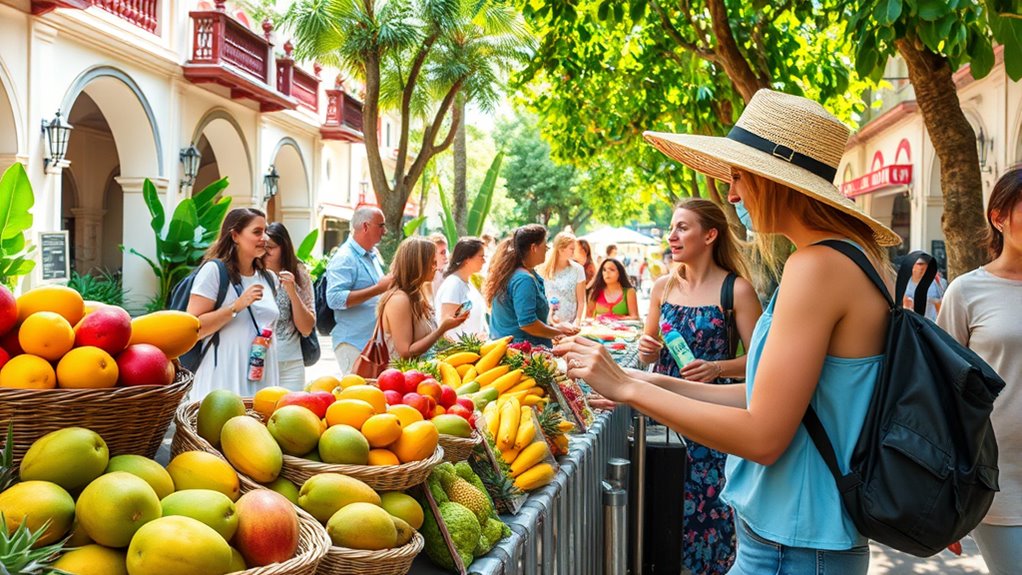To stay healthy year-round while traveling, make sure your vaccines are current and get travel-specific immunizations. Support your immune system with a balanced diet rich in vitamins, stay hydrated, and consider supplements like probiotics and vitamin D. Prioritize good sleep, manage stress, and practice strict hygiene with handwashing and surface disinfection. Being aware of travel-related disease risks and adopting natural remedies can also boost your defenses. Keep exploring how to strengthen your immunity for safer journeys ahead.
Key Takeaways
- Maintain a balanced diet rich in fruits, vegetables, and healthy fats to support immune function year-round.
- Prioritize consistent sleep routines of 7–8 hours to enhance immune resilience during travel and daily life.
- Practice thorough hand hygiene and disinfect surfaces regularly to prevent infection exposure.
- Stay current with recommended vaccines and travel-specific immunizations to protect against regional diseases.
- Incorporate natural remedies like essential oils and supplements (vitamins C and D, probiotics) to bolster immunity consistently.
Prioritize Up-to-Date Vaccinations and Medical Preparations

Staying current with your vaccinations and medical preparations is essential before traveling abroad. Verify your routine vaccines, like influenza, COVID-19, measles, and pertussis, are up to date to protect against common, highly contagious diseases. The flu shot for 2024–2025 offers about six months of protection, and recent COVID-19 formulations, including boosters, are recommended, especially for vulnerable groups. Visit your healthcare provider for medical consultations to confirm your immunization status and discuss any additional travel-specific vaccines, such as yellow fever. Don’t forget to review your travel insurance policy to cover possible health issues abroad. Being prepared helps you avoid illness complications, which can be challenging to manage internationally due to language barriers and access issues. Regularly reviewing your vaccination records ensures you remain protected against emerging health threats. Incorporating a proactive approach to health can further enhance your travel safety. Staying proactive ensures a healthier, stress-free trip.
Optimize Nutrition and Supplement Intake for Immune Support

Maintaining good nutrition is a key factor in supporting your immune system while traveling. To optimize your intake, focus on nutrient timing—eating a diverse range of fruits, vegetables, whole grains, and lean proteins at regular intervals. Incorporate healthy fats to improve absorption of fat-soluble vitamins A and D, which are *essential* for immune regulation. Use supplement synergy by combining probiotics with vitamins C and D to boost immune tolerance and resistance. Here’s a quick overview:
| Key Nutrients | Benefits |
|---|---|
| Vitamins A, D | Support immune cell function and reduce infection risk |
| Probiotics | Promote gut health and immune tolerance |
| Hydrating Fluids | Maintain hydration and energy levels |
| Balanced Diet | Prevent deficiencies and sustain energy |
Consistent nutrient timing and strategic supplementation strengthen immune defenses, especially during travel, when exposure to new environments and pathogens is higher, and understanding contrast ratio can also help optimize your overall health by ensuring restful sleep and reduced stress levels, which are vital for a robust immune response.
Ensure Adequate Rest and Manage Travel-Related Stress

Travel-related stress and insufficient rest can profoundly weaken your immune system, making you more vulnerable to illness. When you neglect sleep hygiene and disrupt circadian alignment, your immune responses suffer. Imagine: 1. Your body’s natural defenses, like natural killer cells, decreasing in activity. 2. Your immune cells, such as monocytes, shifting to a pro-inflammatory state. 3. Your cytokine production, essential for fighting infections, dropping unexpectedly. These changes happen quickly and can persist, especially with chronic sleep loss. Research shows that sleep deprivation can lead to an increase in pro-inflammatory monocyte subsets, which further compromises immunity. To stay resilient, prioritize regular sleep patterns that promote circadian alignment. Aim for 7–8 hours of quality sleep each night, and develop routines that support sleep hygiene—like limiting screen time before bed and maintaining a consistent schedule. This keeps your immune system balanced and ready to defend you. Developing healthy sleep habits is crucial for maintaining optimal immune function during travel and beyond.
Practice Rigorous Hygiene and Behavioral Preventive Measures

Practicing rigorous hygiene and behavioral preventive measures is essential to reduce your risk of infection while traveling. Prioritize hand hygiene by washing your hands with soap and water for at least 20 seconds, especially after using the bathroom and before eating. When soap isn’t available, use an alcohol-based hand sanitizer with at least 60% alcohol. Surface disinfection is equally important; regularly clean high-touch surfaces like door handles and elevator buttons with effective disinfectants. Public travel facilities often lack sufficient handwashing stations and clean surfaces, so carrying your own sanitizer and disinfectant wipes helps. Additionally, follow safe food handling practices and stay aware of local sanitation conditions. Travelers’ concerns about hygiene practices have increased during the pandemic, highlighting the importance of personal measures. Incorporating effective disinfectants that are suitable for various surfaces can further enhance your protection. These simple steps markedly decrease your chances of contracting illnesses and help you stay healthy throughout your journey.
Understand How Travel Patterns Influence Disease Risks

Your travel choices substantially shape your risk of encountering infectious diseases. Travel destinations play an essential role in disease exposure. For example: 1. Visiting regions like Sub-Saharan Africa or Southeast Asia increases your chance of exposure to malaria, typhoid, or other tropical illnesses. 2. Traveling to countries such as Mexico or India elevates your risk of infectious diseases, especially if you lack proper pre-travel health precautions. 3. Returning to familiar VFR destinations often means higher disease exposure, especially if you don’t seek medical advice beforehand or skip preventive medications. Travel patterns, including destination and purpose, influence your infection risk notably. Being aware of regional health risks and adjusting your travel plans accordingly can help you avoid unnecessary illness and protect your health year-round. Modern air travel can reach any part of the world within 36 hours, significantly increasing the speed at which infectious diseases can spread across borders. Additionally, understanding the importance of preventive health measures can greatly reduce your vulnerability during travel.
Incorporate Lifestyle Habits That Sustain Immunity Throughout the Year

Maintaining a strong immune system requires consistent lifestyle habits that support health year-round. Hydration strategies are essential; drinking at least eight glasses of water daily keeps toxins moving and helps your organs function *best*. Herbal teas and fruit-infused water can boost antioxidants and improve fluid intake. Embracing cultural dietary practices also plays a *crucial* role. Incorporate nutrient-rich foods like citrus fruits, garlic, ginger, spinach, and fatty fish to supply essential vitamins and minerals that support immune defenses. Limiting processed foods, sugars, and saturated fats reduces inflammation and helps maintain immune efficiency. Regular physical activity and stress management further enhance your body’s ability to fight infections. Adequate sleep is also vital, as it helps regulate immune function and promotes recovery. Additionally, using essential oils such as eucalyptus and tea tree oil can support respiratory health and boost your overall immunity. By combining these habits, you create a resilient immune system that stays strong throughout the year.
Frequently Asked Questions
How Can I Boost Immunity During Long-Haul Flights Effectively?
To boost your immunity during long-haul flights, focus on hydration tips like drinking water and electrolyte drinks to stay hydrated and fight dry cabin air. Practice good hygiene practices by wearing a mask, using hand sanitizer regularly, and disinfecting surfaces. These steps help reduce germ exposure and dehydration, supporting your immune system. Additionally, avoid touch and keep nasal passages moist, further strengthening your defenses against illness during travel.
Are There Specific Foods That Provide the Best Immune Support While Traveling?
Imagine your immune system as a sturdy fortress; you need superfoods benefits to reinforce its walls. Pack immune boosting snacks like citrus fruits, red bell peppers, and kiwis—nature’s powerhouses packed with vitamin C. Add probiotic-rich options like yogurt and sauerkraut to keep your gut strong, and include nuts and green tea for antioxidant support. These foods work together, forming an armor that helps you stay healthy and resilient on your journey.
What Are the Signs of Immune System Fatigue From Frequent Travel?
You might notice travel fatigue and immune exhaustion as persistent physical exhaustion despite resting, lasting weeks after travel. Long flights or drives drain your energy, while disrupted sleep and elevated stress hormones weaken your immune system. Frequent colds, flu symptoms, or prolonged recovery indicate your immunity’s compromised. Dehydration, poor nutrition, and irregular routines also contribute to immune fatigue, making you more vulnerable to infections and slowing down your overall health.
How Does Travel-Related Stress Impact Long-Term Immune Health?
Travel-related stress can weaken your immune health over time, especially if you neglect stress management and sleep hygiene. Constant stress increases cortisol, suppressing immune responses and making you more vulnerable to infections. Poor sleep exacerbates this effect, delaying recovery and causing immune exhaustion. To protect your immunity long-term, prioritize stress management techniques and maintain good sleep hygiene, helping your body stay resilient despite travel demands.
Can Certain Supplements Replace the Need for Vaccines Before Travel?
Your question is a million-dollar one—supplements can’t replace vaccines. No matter how effective or safe they seem, supplements don’t offer targeted immunity like vaccines do. Relying solely on supplement safety and skipping vaccines puts you at serious risk of preventable diseases. Vaccines remain the most reliable way to protect yourself during travel, providing proven effectiveness that supplements simply can’t match. Don’t gamble with your health—stick to recommended immunizations.
Conclusion
By staying proactive with vaccinations, nourishing your body, managing stress, and practicing good hygiene, you’re building an immune shield that keeps you healthy year-round. Think of your habits as the sturdy roots of a tree—grounded and resilient against the storms of travel-related illness. Keep these habits in mind, and you’ll navigate your journeys with confidence, turning every trip into a healthy adventure rather than a gamble. Your immune system is your best travel companion—treat it like gold.









